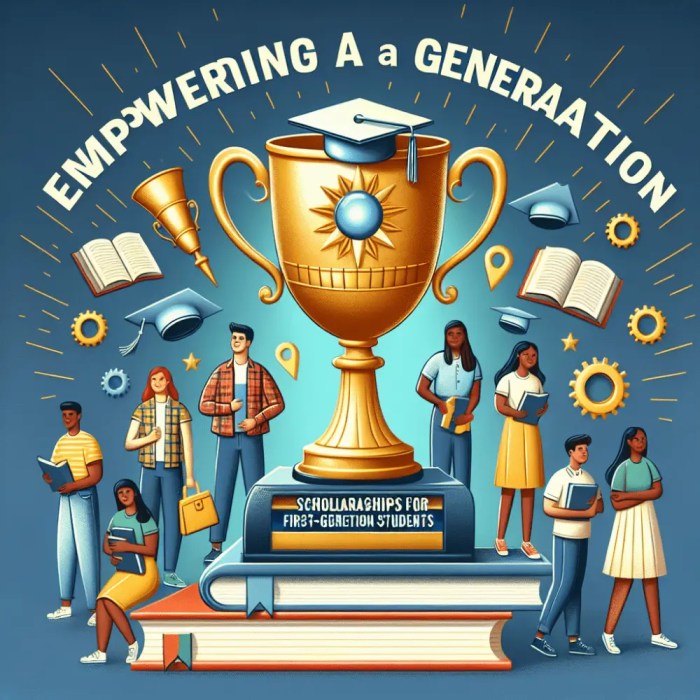Understanding Scholarships for First-Generation Students

First-generation students are those whose parents did not attain a four-year college degree. This demographic plays a crucial role in the landscape of higher education, often bringing diverse perspectives and experiences to campuses. However, the journey to higher education for first-generation students is often fraught with challenges. These students frequently face barriers such as a lack of familial guidance on college preparation, financial constraints, and lower awareness of available resources.
The financial challenges encountered by first-generation students are particularly pronounced. Many come from low-income backgrounds, making it difficult to afford tuition, books, and living expenses. As a result, scholarships tailored for this group are essential in providing the necessary support for them to pursue their academic goals.
Types of Scholarships Available

Various scholarships specifically cater to first-generation students, aiming to alleviate some of their financial burdens. Understanding the types of scholarships available can empower these students to seek out opportunities.
- State-Level Scholarships: Many states offer scholarships targeting first-generation students. For example, the California Dream Act allows undocumented students to apply for state financial aid, including grants and scholarships.
- National-Level Scholarships: Organizations like the Gates Millennium Scholars Program provide substantial financial support to exceptional first-generation students across the United States.
- Private Organizations and Foundations: Numerous foundations also fund scholarships. The Jack Kent Cooke Foundation, for instance, offers scholarships to high-achieving students who demonstrate financial need.
Eligibility Criteria for Scholarships
Scholarships for first-generation students often come with specific eligibility requirements that applicants must meet. Understanding these criteria is vital for potential applicants to enhance their chances of securing funding.
- Common Requirements: Many scholarships require applicants to be enrolled in or accepted to an accredited college or university.
- Academic Performance: Successful scholarship candidates typically exhibit strong academic performance, often measured through GPA or standardized test scores.
- Financial Need: A significant number of scholarships place a strong emphasis on financial need, requiring applicants to submit financial aid forms such as the FAFSA.
Application Process for Scholarships
Navigating the scholarship application process can be daunting for first-generation students. Understanding the steps involved can simplify this experience.
- Application Steps: Students should begin by researching available scholarships and carefully reading the eligibility criteria and application requirements.
- Documents Checklist: Common documents needed include transcripts, letters of recommendation, and proof of income.
- Personal Statements: Crafting a compelling personal statement is crucial. Students should focus on their unique experiences and aspirations to create a narrative that resonates with scholarship committees.
Resources for Finding Scholarships
Several resources exist to help first-generation students locate scholarships tailored to their needs. Utilizing these resources can significantly enhance their scholarship search.
- Websites and Databases: Platforms like Fastweb and College Board offer comprehensive scholarship searches, categorizing opportunities based on various criteria.
- Networking Tips: Engaging with community organizations and attending local educational events can uncover additional scholarship opportunities.
- Role of School Counselors: School counselors are a valuable resource, providing guidance and assistance in identifying scholarships suited for first-generation students.
Impact of Scholarships on First-Generation Students, Scholarships for first-generation students
The benefits of scholarships for first-generation students extend beyond financial assistance. They can significantly influence both personal and academic outcomes.
- Short-term Benefits: Scholarships can alleviate immediate financial pressures, allowing students to focus on their studies without the burden of excessive debt.
- Long-term Benefits: Graduates who receive scholarships often report better career outcomes, including higher starting salaries and increased job stability.
- Success Stories: Numerous first-generation students have shared their success stories, illustrating how scholarships enabled them to achieve their educational goals and pursue meaningful careers.
Challenges in Securing Scholarships

Despite the many opportunities, first-generation students often encounter specific challenges in securing scholarships.
- Common Challenges: Misinformation about available scholarships can deter students from applying. Additionally, a lack of resources may hinder their ability to complete applications.
- Impact of Misinformation: Many first-generation students do not realize the full range of scholarships available to them, leading to missed opportunities.
- Overcoming Obstacles: Seeking guidance from mentors and utilizing available resources can help students navigate the scholarship application process more effectively.
Future Trends in Scholarships for First-Generation Students
The landscape of scholarships for first-generation students is evolving, influenced by various trends and policy changes.
- Emerging Trends: Increasingly, organizations are recognizing the unique challenges faced by first-generation students, leading to the creation of more targeted scholarships.
- Policy Changes: Legislative changes at both state and federal levels may enhance funding for scholarships aimed at first-generation students.
- Technology’s Role: Advances in technology are streamlining the scholarship application process, making it easier for students to apply for multiple scholarships simultaneously.

